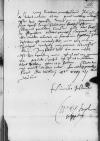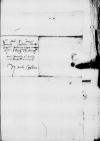Letter #723
Cornelis DE SCHEPPER to Ioannes DANTISCUSParis, 1531-12-06
English register:
De Schepper has arrived in Paris and is looking for books recently published there. As for books published in Germany, one can buy them more easily in the Netherlands. In the recent edition of Erasmus' colloquies there is a new one in which he mocks the burial of Alberto [Pio], Prince of Carpi. In this way Erasmus provoked opposition from the theologians. There are no new publications on the Holy Scriptures that have not reached Dantiscus yet.
| received Brussels, [1531]-12-22 Manuscript sources:
Auxiliary sources:
Prints:
| ||||||||||||||
Text & apparatus & commentary Plain text Text & commentary Text & apparatus
Reverendissimo Domino, domino
In aula
Salutem plurimam.
Veni
Humilis inservitor
[1 ] The colloquium Exequiae Seraphicae mentioned here was first published in the edition of September 1531 (Basel, Hieronymus Frobenius and Nicolaus Episcopius) of Erasmus’ Colloquia

